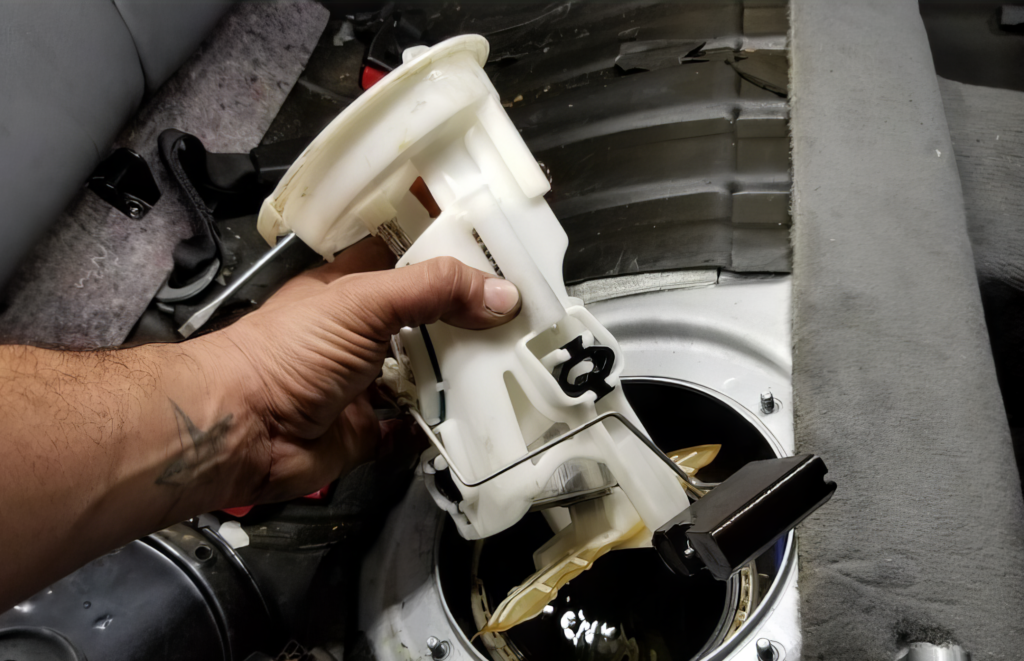Why does my BMW stutter when I accelerate? This has been a puzzle for many BMW owners.
This issue can be frustrating, especially when you expect smooth performance from a brand like BMW.
The reasons behind this could range from simple maintenance oversights to more complex mechanical issues. However, understanding these causes will certainly help us in resolving this problem.
In this guide, we’ll delve into why your BMW might stutter during acceleration and offer some practical solutions to get it running smoothly again.
Identifying Potential Causes to a BMW Stutter
The journey to resolving your BMW’s stutter during acceleration starts with understanding. Let’s break this down together.
Fuel System Issues

Let’s take a look into the core of your car – its fuel system – to begin. One extremely common cause to a BMW stutter is a faulty fuel injector. This could just be that your fuel injector is clogged or there could be a more problematic mechanic/electrical fault with your fuel injector(s). Each fuel injector has a set of tiny pin-sized holes which actually inject the fuel into your BMW’s combustion chamber. Due to their tiny size, these holes are susceptible to clogging due to sediment buildup.
One simple trick to potentially fix a clogged fuel injector is to use some fuel injector cleaner. Fuel injector cleaner will cost you less than $10 and is simply dumped into the fuel tank during fill up. This is not a magical cure though and likely will not clean out a fuel injector that is already clogged up. But given how cheap and easy this solution is, it’s definitely worth a try!
Vacuum System Leak: An Invisible Culprit
Next up in our lineup of suspects is a leak in the vacuum system – something that is not visible but can be potentially harmful nonetheless. This intricate system plays a crucial role in ensuring that your car’s engine runs smoothly and efficiently. However, if there are leaks in the seals, gaskets, or hoses of this system, it can lead to issues such as stuttering when you accelerate.
A properly functioning vacuum system is vital for maintaining optimal performance in any vehicle. It regulates various functions, including brake boosters and electronic throttle controls, which directly impact the acceleration cable links and ultimately affect how well your car accelerates. If these components are not working correctly due to a leak or other issue within the vacuum system, it can cause jerking motions while driving.
One extremely simple and easy thing to quickly check is that your engine air filter is not clogged. Engine air filters can become incredibly clogged overtime and a badly obstructed air filter can limit airflow into the engine, causing those annoying hiccups while driving at high speeds or under heavy load conditions.
Ignition System Problems

Moving onto another critical part of your car – the ignition system. This plays a crucial role in ensuring top-notch engine performance so any hiccups here might be why your ride is less than smooth lately. Worn out spark plugs or coil packs will commonly cause engine stuttering during acceleration.
The ignition system’s role in igniting the air-fuel mixture within each cylinder is crucial for the smooth running of your car’s engine. Misfires caused by failing spark plugs and coil packs can manifest as stuttering during acceleration.
If worn out spark plugs or coil packs are a concern, it’s important to follow the below steps to get to the bottom of the problem:
- Run a code reader through the OBD II port and check for any misfire codes. Engine fault codes typically won’t be so specific as to tell you if you have a bad spark plug or coil pack but they will narrow down the list of possibilities.
- Pull a spark plug or two and examine it. Is there significant carbon buildup on the plug?
- If your examination reveals carbon buildup on the spark plugs or a burnt out coil pack, replace the faulty part and test your vehicle out.
Troubleshooting Tips
Figuring out the cause of stuttering when pressing on the accelerator can be a tricky task. Let’s explore how to troubleshoot the potential causes of a BMW stutter identified above.
Checking Fuel System Components
A well-maintained fuel system is essential for optimal performance in your BMW. If any part within this intricate network fails or wears out, it can result in stuttering during acceleration.
When was the Last Time Your Fuel Filter was Replaced?

Fuel filters rarely need replacement as they have a relatively long lifespan. BMW recommends that they are replaced every three years, although I rarely hear of people adhering to this schedule. A severely clogged fuel filter can certainly cause issues with sputtering as it will reduce the amount of gasoline making its way to the fuel injectors.
How can you test your fuel filter? There isn’t really a great way to test a fuel filter, but luckily, on most BMW models, they are relatively easy and inexpensive to replace. They are typically located underneath the vehicle on the driver’s side and sell for less than $40.
****Keep in mind that whenever you are replacing fuel system components, you absolutely must depressurize the fuel system first! Otherwise, prepare to take a shower in gasoline.****
A Bad Fuel Pump
A healthy fuel pump is vital for a smooth ride in your BMW. The fuel pump is responsible for delivering gas from the tank to the engine. If the fuel pump starts to fail, it will negatively impact your vehicle’s performance. Pay attention to any unusual noises near the fuel tank area or sluggish throttle response, as these are signs that the fuel pump may need immediate attention.
When fuel pumps fail, they typically don’t provide much warning, they just leave you stranded in the middle of the road. Given this, if you suspect a fuel pump problem, be sure to test or have a professional test and replace the pump quickly.
The most simple way to test a fuel pump is by using a fuel pressure tester. These can typically be picked up at your local auto parts store for free as a tool rental. Check out a video here for a detailed walkthrough on how to use a fuel pressure tester.
Keep in mind when checking the condition of fuel system components, it is important to consider their impact on overall operational efficiency. Malfunctioning parts can significantly affect engine performance and driving behaviors, particularly in relation to speed dynamics and acceleration. Addressing any issues promptly and ensuring proper functioning of these components is crucial for a smoother driving experience.
Checking Ignition System Components

Now that we have discussed some of the potential ignition system related causes of a BMW stutter, let’s look into how we can identify the particular problem.
The Role of Spark Plugs and Ignition Coils
There are a couple of simple tests you can run to confirm whether you have a spark plug/coil pack problem. As mentioned above, simply inspecting the spark plugs for corrosion or significant wear is a great first step.
But if that is a straight forward test for the spark plugs, how can we test the coil packs? Luckily, coil packs are really simple to test as well. You will need an “ignition tester” which you basically plug into the coil pack, start the engine and see if there is a spark.
Ignition testers are extremely cheap, but keep in mind, you’re playing around with electricity when you are testing coil packs so always follow directions for proper troubleshooting.
If there is no spark, you’ve got a bad coil pack and it will need to be replaced to eliminate the engine sputtering. Check out this video here for a tutorial on using an ignition tester.
Troubleshooting Issues with the Engine Control Unit (ECU)
While issues with your BMW’s ECU are less likely to cause a stuttering problem than the previously mentioned causes, ECUs have gotten significantly more complex over the years and more and more vehicular problems can be traced back to software issues. This small but powerful computer is responsible for controlling various aspects of your vehicle’s performance, including fuel injection and ignition timing.
Generally speaking, troubleshooting the ECU requires some technical knowledge and software that most DIYers do not have. If you suspect that there is a problem with your BMW’s computer, you may need to bring your vehicle to a certified technician to diagnose and fix the problem.
Conclusion
Getting to the root of why your BMW stutters when you accelerate can be a bit tricky, but not impossible.
We’ve taken a deep dive into common causes like clogged fuel injectors and faulty spark plugs.
Troubleshooting these issues might involve inspecting different parts such as the fuel system components or ignition system elements.
Sometimes, it’s even necessary to examine something as complex as the Engine Control Unit (ECU).
Now that we’ve explored this topic together, I bet you feel more confident about diagnosing and fixing stuttering problems in your beloved ride. But there’s so much more to learn!
A Better BMW, is dedicated not only for those who love their Bimmers but also for those seeking expert advice on maintaining them. Join us, and let’s make every drive smoother than ever before!
FAQ Section
1. Why does my BMW stutter when I accelerate?
Stuttering during acceleration in a BMW can be caused by various factors. Common culprits include faulty fuel injectors, a leak in the vacuum system, and worn out spark plugs or coil packs. This article aims to guide you through identifying and troubleshooting these issues.
2. What’s the first thing I should check if my BMW stutters?
Start with the fuel system; specifically, look for clogged fuel injectors. You can use a fuel injector cleaner as a preliminary measure. If that doesn’t solve the issue, you may need to delve deeper into other parts of the car, like the vacuum and ignition systems.
3. How do I know if my fuel injectors are clogged?
Symptoms of clogged fuel injectors include poor acceleration, engine misfires, and inconsistent power delivery. While you can use a fuel injector cleaner as an initial remedy, more severe cases may require a more thorough mechanical inspection.
4. Is it easy to replace the fuel filter?
Replacing a fuel filter on most BMW models is relatively straightforward and inexpensive. It’s generally located underneath the vehicle on the driver’s side and costs less than $40. However, remember to depressurize the fuel system before attempting a replacement to avoid spills.
5. What is a vacuum system leak, and how does it affect my BMW?
A vacuum system leak occurs when there are leaks in the seals, gaskets, or hoses of the vacuum system. This system is essential for maintaining optimal engine performance. A leak can cause stuttering during acceleration and should be addressed promptly.
6. How do I check for worn out spark plugs or coil packs?
You can use a code reader to check for any misfire codes. Physical inspection of the spark plugs for carbon buildup can also help. Coil packs can be tested using an “ignition tester” to check for the presence of a spark.
7. Can the Engine Control Unit (ECU) be the cause of stuttering?
While less likely, issues with the ECU can lead to performance problems like stuttering. Troubleshooting the ECU often requires specialized software and technical knowledge, making it advisable to consult a certified technician for diagnosis.
8. Can software issues cause my BMW to stutter?
Yes, as vehicles get more advanced, software issues are increasingly responsible for various problems, including stuttering. It’s best to consult a certified technician if you suspect software-related issues.
9. How do I know if my fuel pump is failing?
Signs of a failing fuel pump include unusual noises near the fuel tank area or sluggish throttle response. If you suspect a fuel pump issue, it’s advisable to have it professionally tested and replaced as it can fail suddenly.
